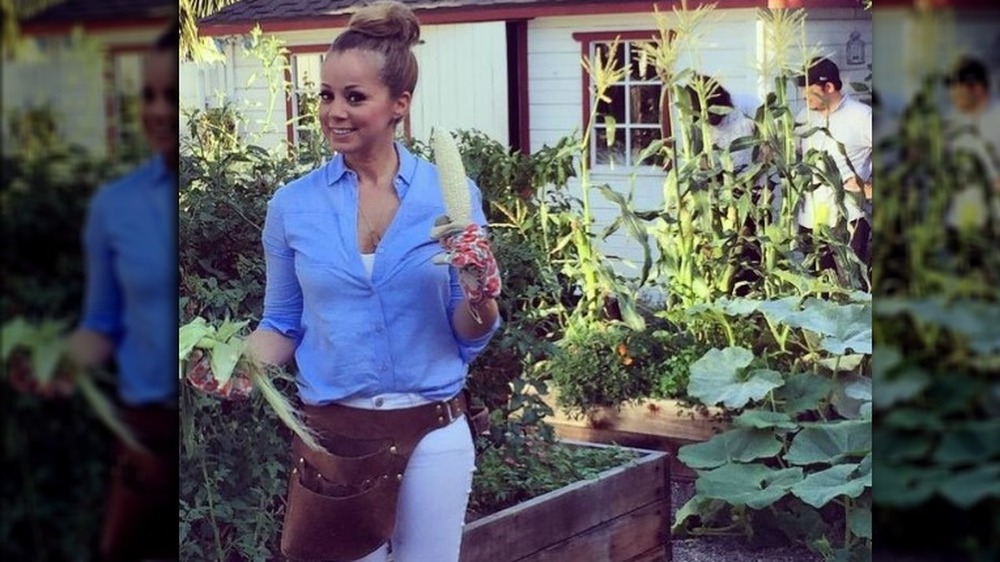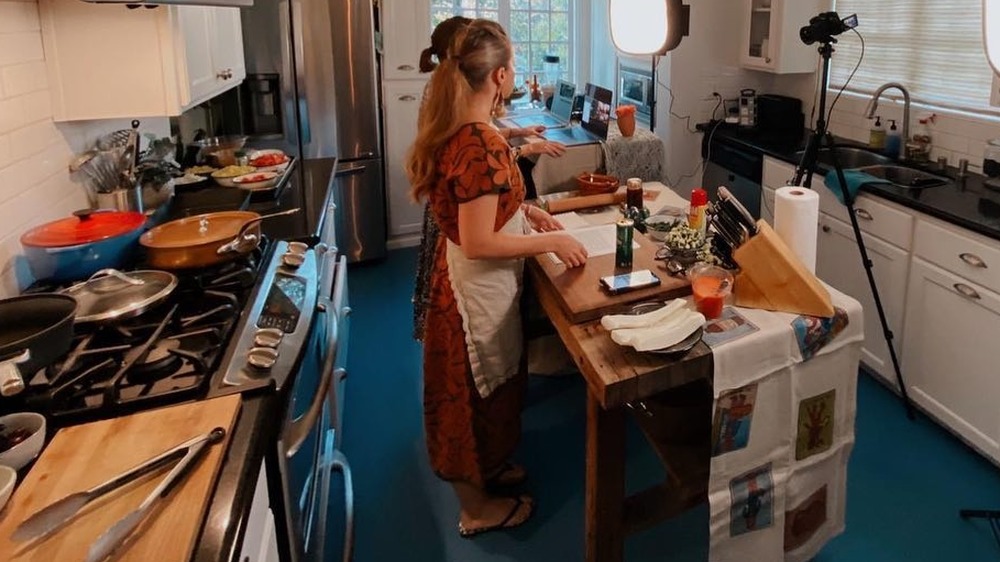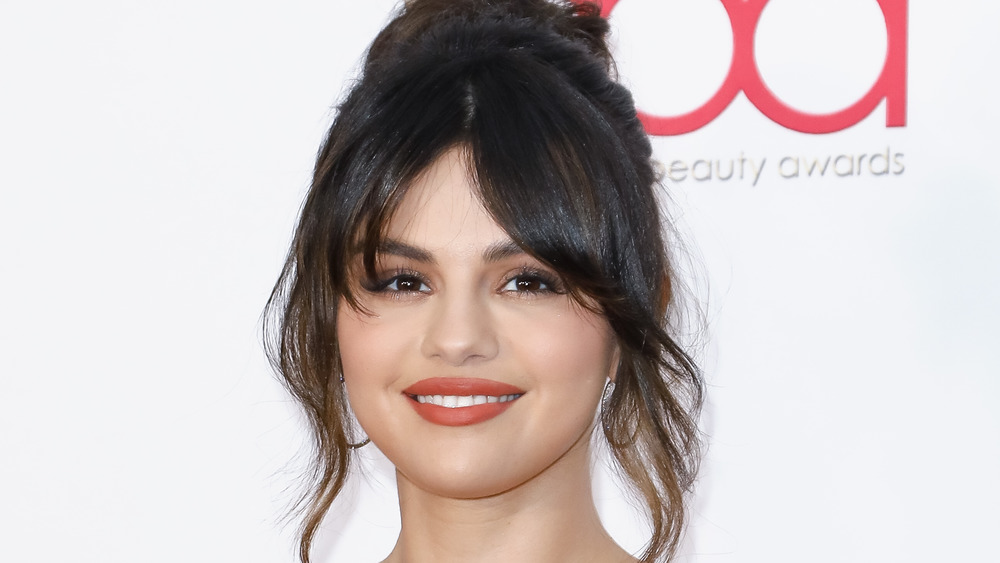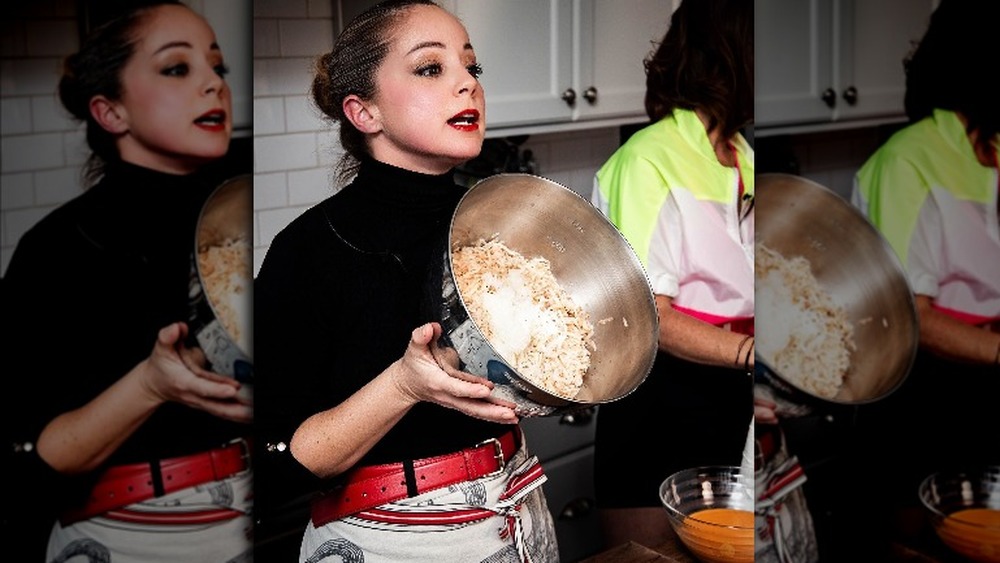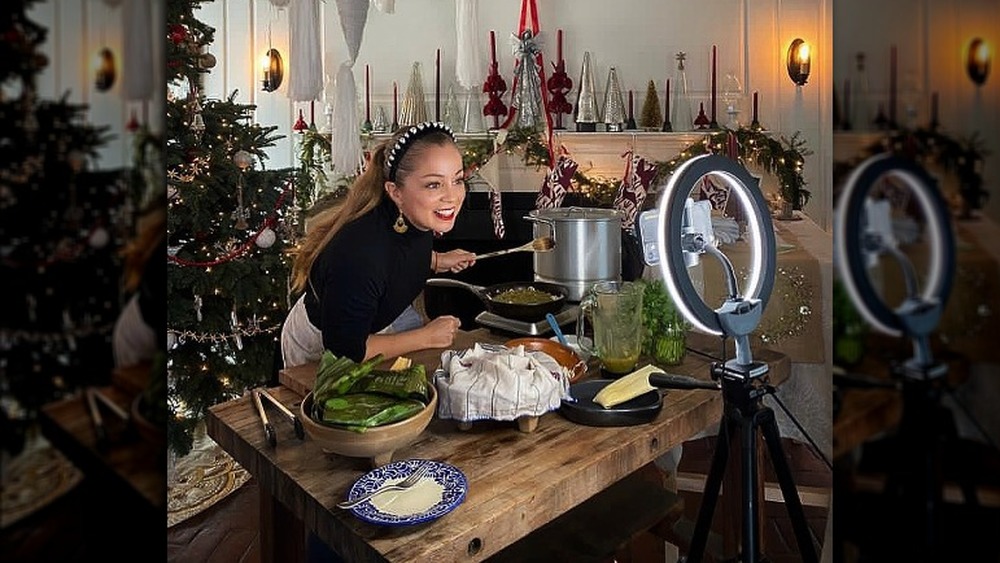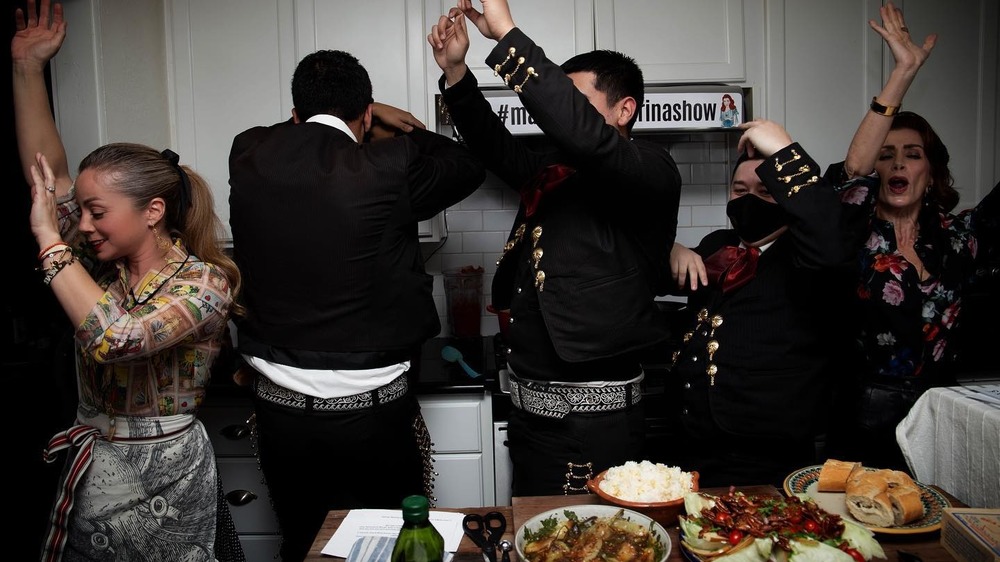Marcela Valladolid Talks Cooking Via Zoom, Authentic Mexican Food, And What It Was Like Filming Selena + Chef - Exclusive Interview
For Chef Marcela Valladolid, the last year, pandemic year one, has been all about cooking with family. But that's really nothing new for this former Food Network starring, cookbook-authoring, classically-trained chef: for Chef Marcela, cooking has always been all about bringing people together in the kitchen, and for her, family are the most important people of all.
She sat down to talk with Mashed about sharing the love for all things culinary with everyone from her own kids to international superstar Selena Gomez — who she joined for an episode of Selena + Chef on the second season of the HBO Max series.
And she also talked about the cuisine closest to her heart: authentic Mexican. As host of Mexican Made Easy for multiple seasons, author of multiple cookbooks focused on Mexican food, and with years of experience cooking Mexican food (and training at an early age in her aunt's cooking school in Baja), Valladolid has plenty to say about the topic, including some gentle words on what most people get wrong about the dishes of her heritage.
Chef Marcela's mission to change minds about Mexican food
Describe yourself for us in just a few words.
I'm a classically trained chef, whose purpose in life is to show the true culture, and food and traditions of Mexico.
So what are some things that people just get wrong about Mexican food? What are some misconceptions, or some things you wished people just got right about it, that they tend to get wrong?
I think, and it's no fault of their own, it's just what the U.S. market is exposed to, [there's] a limited view in terms of what Mexican cuisine is. And it's some of our most beautiful ingredients — tortillas, beans, and perhaps rice, and everything that works around that. At the [Food Network] that I was on, their most searched Mexican recipe was chili. And we don't really make chili, maybe in some parts of Northern Mexico. And like I said, that's no fault of their own, it's just what people are exposed to. So those ginormous corporations that have a platform, need to do a better job of exposing the general market to better recipes, better ingredients, and give us more accurate representation.
Mexico is one of the, actually is the most bio-diverse country in the world. So just from region to region, it's almost like experiencing a different country in terms of cuisine. And I wish people understood that, like what you get into Yucatan, compared to what you get in the coast of the Pacific, over here with us in the North, versus central Mexico with their pre-Hispanic traditions from Oaxaca and Puebla, it's just so vast. And then I think, I just posted the other day about what people wanted to see in terms of healthy Mexican cuisine. And somebody was like: "At the moment you ask for healthy Mexican, it's no longer traditional or accurate." And I was like, "You are so wrong." We have some of the most beautiful ocean to table dishes, that are super light and fresh, like nothing that you find here in the states.
So, I wish people would understand that a little more about Mexican food. Because honestly, sadly, right now people think of Mexican food as that fatty, indulgent, guilty pleasure sort of situation. And I wish people would move away from that a little bit.
Marcela Valladolid on formal training in culinary schools around the world
How has your formal education in varied aspects of the culinary arts helped to inform your work with aspiring newer chefs, those people who will be watching you on the screen, who might not have anything like a formal education?
I think having a formal education really helped me to streamline recipes, and simplify recipes, and I think that's my forte, and I think that's kind of what we did on the show [Mexican Made Easy]. I took recipes that are — say one recipe, mole, for example, that's considered really, really difficult. It's one of our most quintessential, culturally representative recipes, and I make it simple, and I think that's what I can bring to the table, and that's how I make it approachable. I take these ideas, like tamales and things that seem impossible to make, and I break them down and I make them easier.
How did studying in Paris change the way you approach traditional Mexican cuisine, or influence your approach to your family's native cuisine, or did it in any way?
People are like, "Why Paris?" And people don't realize that so many of our quintessential traditional Mexican recipes have a European influence, obviously because of colonization. So, the recipes that people associate the most with Mexican cuisine, especially with pastries, which is what I specialized in [during] my studies in Paris, like churros, the [inspiration] is fully French. Flan is a Spanish custard, like at the end of the day so many of our foods. Chiles en Nogada? It's a combination of very native Mexican ingredients, and ingredients that were brought over by the Spaniards, and techniques that were used by the French.
So my studies in Paris, they didn't at all change the way I approached my cuisine. They actually helped me understand it better, because so many of our quintessential desserts, and desserts that most represent Mexico, especially out there in the world, even in the fast food world, like churros and stuff that I mentioned, it all comes from European-influenced ingredients and procedure. A lot of it does. And some of our most beautiful dishes are a marriage of the two, of the native pre-Hispanic ingredients, and new ingredients brought over from Europe, and procedures brought over from French technique. So, it just kind of enhanced and gave me a better understanding of the roots of many of our traditional dishes."
Chef Marcela talks about working with Selena Gomez on Selena + Chef
What was the best thing that happened during the filming of Selena + Chef for HBO Max?
I think the best thing that happened is I got a note after we finished the testing, that [Selena] devoured all of the food, and all of the leftovers. And I think, It's Selena Gomez. She's one of the biggest pop stars, or just celebrities on planet earth, a kabillion followers. But more than anything, she's someone that was intimidated by this recipe, and she got to make it fully on her own, and it came out great. And that's the biggest satisfaction.
Was there anything where you thought, oh my God, I can't believe that just happened, especially given the need to record it remotely, with crews in two locations? Or was it all pretty smooth?
I think it was all pretty smooth. There was a moment where I sensed she needed a break, I'm a mom and I'm very in tune with other people's feelings and needs. And I was like, "How about we take a five minute breather, and kind of get readjusted?" And it was perfect, because then we started on a whole new recipe.
And she was such a willing participant, and the production, honestly, it was me that would push back when I was like, "Are you sure you guys want to make tortillas from scratch?' Because it can get sticky, and if you've never done them before, it's not a complicated process, but it definitely takes two or three times to get right." And they're like. "Nope, we're doing the whole thing." And it was really, really refreshing to see that courage.... I know that when I was on the Food Network, there was definitely an attempt to simplify recipes, because the audience might not necessarily be familiar with the Mexican ingredients, techniques, tradition, culture, procedures. So, there was definitely an attempt to modify recipes, for ingredients that they could find at the everyday market, without having to go to the Hispanic market or whatever. With Selena, I loved doing the show because it was like no holds barred, make tortillas from scratch, get all of the traditional ingredients like chilis for mole. Don't skip on any of the parts of the recipe, don't streamline it, it was like teach her how to do this right. And as a chef with a different cultural background like myself, that's so deeply rooted in tradition, to get that opportunity, and on such a huge platform, it meant everything to me. It was really special to truly represent, and truly cook my recipe as it needed to be cooked, traditionally.
I am eternally grateful to her and her production team, because I saw that it was doable. I was afraid about connectivity and internet issues, and I learned so much in that production [from] how they set up my kitchen, from lighting, from this to that. They were my teachers in those 10, I don't know how many hours the production spent in my house, and setting this whole thing up.
And it was just really inspiring — how many chances do you get in life to connect and have a conversation, and have a morning, or spend the day with somebody that has such a massive impact on people's lives? It must be really hard for her, I can't imagine. I have one one thousandth of the amount of followers that she has, and every once in a while, it definitely gets overwhelming to have so many people have an opinion on your life, and out in the streets. It's overwhelming, I have no idea what it must be like for her. And even then, she's such a sweet, and kind, and generous young woman. And it was just an eye-opening experience in many different categories, shooting that show.
Did anything happen while you were filming Selena + Chef, that you wish fans got to see, that they're probably not going to get to see?
I usually have a lot of [people] around, I have three kids and there's a lot of activity happening in my house. And the thing that I'm most passionate about is including, I'm very grateful I fortunately get to include my family in everything. They're in all my books, they're in all my shows, they're in all of everything. [Selena] was very gracious and said hi to my babies and to my teenager. And I was like: 'I just hope they make it into the show because they're such an important part of my career.' I haven't seen the edit, so I don't know. I introduced my family, and I actually was just talking to my teenager yesterday because all of his friends, we were all giggling at the fact that we didn't know if he was going to end up on the cutting room floor."
For Chef Marcela, COVID changed a lot of things for the better
How did the pandemic affect your production and your career? Anything else that's been strange over this last year, how has that affected you?
Courage, it gave me courage... Mortality just felt a little bit closer than it's ever felt before. And I think for me, it was definitely a kick in the butt, in terms of why not do that thing that you've been afraid to do before? And I actually started on three or four different projects that had been, that the seeds had been planted over the past decade, honestly. Nothing was started from scratch, it was all ideas that have existed in my head for a really long time. And in the last couple of months, I've just been like, screw it man, we're getting it done... If you fail, you fail, but you're not going to leave this without trying. So, I think that's what pandemic has done for me, is it's given me the courage to put myself out there. And fortunately, it's just been a lot of success, so I'm really fortunate...
Ever since the beginning of pandemic, Phillip, who's my partner in life and in work, he kept trying to push me to do the Zoom cooking classes. And I was like, "No, I don't want to deal with that." I didn't want to put myself out there.
What do you think is going to be the long-term effect of the pandemic on the everyday cook?
I think an understanding that they can do it themselves. For those of us that cook, this was easy. For people like my sister that can't make a sandwich to save her life, or she lives on cereal unless she's eating out, they were forced to learn. And I think pandemic, and being at home, and having to connect with people like myself, or other online cooking classes, or getting cookbooks or experimenting, I think it just became an understanding that we went back to basics, where we all actually had to cook for ourselves and our families. And I think that is so beautiful.
And another great thing is technology, like food delivery. We did a tamale cooking class, and I hooked up with MexGrocer, which is an online marketplace, and they ended up delivering three tons of fresh Masa across the United States and Canada, so we could cook tamales together. That couldn't happen 15, 20 years ago, not even that long, maybe five years ago it wouldn't happen.
Because of the connectivity of the internet, and ingredients now being available in food delivery, there is no excuse for you to not dabble in international cuisine, traditional Mexican cuisine, the chilis will get to you, the masa will get to you. I love this idea that people can get back to their traditions, or their family recipes or their grandmother's recipes, because now we have all of this accessibility to ingredients, and people that can teach you online.
Chef Marcela's advice for aspiring cooks
What advice do you have for people who want to take their cooking up to the next level?
Experiment, more than anything. Well, actually before experiment, and I say this often too, for example if you're not well-versed in Mexican cuisine or Mexican ingredients, buy a Mexican book by your favorite author (I have plenty, but it doesn't have to be mine) and really read the recipes. This is where you don't experiment, just really follow those recipes, measure the ingredients properly, read the procedure, and really adhere to the recipes, so that you understand the chef's point of view. And once you feel really comfortable with those recipes that came from an authentic source, then you can start to play and you can start to take out ingredients or put in ingredients. I mean, if you have food allergies, or you hate an ingredient like cilantro, definitely take that out. But if you really, really want to learn a cuisine, go to a trusted source, follow recipes to the T, and then go back and play a little bit.
What are some of the challenges of cooking in front of cameras the average viewer or home chef might not appreciate?
Now that I'm doing live Zoom cooking classes, because my whole entire career it's been about production, and swap out, and perfect looking dishes, [people see] that it's messy. It just is. I feel like, and I love doing this, because sometimes I'm cooking [and] I have to bring out a blender that I forgot I was going to use during that class, and it's my busted blender. I think it's a great way, especially for beginner cooks in my classes, we have about a thousand of them at a time, which is kind of insane. A lot of them are beginner cooks, and for them it's like, oh, it's so great to see you just kind of... In our shows, the ones that I've done on TV, you're literally bringing out swaps, and everything is so clean and everything is so perfect.
And here, you can literally see me stacking bowls, you can see me having to start all over again if my pan got too hot. We haven't burned anything as of yet, but I love even if I'm a clean freak in the kitchen, I'm a clean as you go kind of gal, and even then, I love that they see that it's just a messy, messy process, and it's not perfect. And I love that the biggest response that I've gotten so far is that I've given a lot of people that are watching the freedom to move in different directions when it comes to recipes. Because I will do full stops and I will be like, "You can just add salt here, but you can also add a little bit of Chipotle powder, or add a little bit of onion powder." So, I think giving people the freedom to trust their innate culinary capabilities, that's also a big one.
The dishes everyone should know how to make, and one we all need to try, according to Valladolid
What's one dish you wish you could share with everyone on earth?
Oh gosh, what a great question. I didn't know that one was coming. I think I would say, I would say mole. Mole is the one that truly, it has so many ingredients, it's representative of many different regions. It's so multilayered in terms of flavor, ingredient, texture, and it's multipurpose too. It can be served the traditional way, it can be served over nachos if you want to get a little crazy. You can make enchiladas and that can be your salsa. It can be used for a million different recipes, so I would introduce mole to planet earth, to whoever's not familiar.
What are two or three dishes that you think everyone, even if they don't consider themselves a cook, if they don't really want to cook all that much, what are two or three dishes everyone just really needs to know how to make?
In Mexico — look I'm obviously a very feminist independent woman — but we say in Mexico that you can't get married until you know how to make rice. So, I would say rice is one of them, a perfectly fluffy rice. And it's actually a really intimidating dish. When I post about rice, I get so many messages about people that are insecure about perfect rice. So, rice is an important one.
Roasting a chicken is essential, essential for life. Just any kind, a whole roasted chicken is incredible, but just cooking chicken in general, because it's such a versatile dish, especially if you have kids. So, I would say that the roasting of a chicken is super important.
And maybe the third, because I'm Mexican, we're going to lean towards Mexican, a good pot of beans. Those are hard to get to tender, without them bursting. You can't salt them too early, because they get tough and they never really tenderize. There's so many tips and tricks to getting the perfect pot of beans, and they live in our refrigerator. So, it's an essential for us as well.

